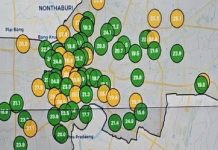Thai students in remote areas have received tablet computers in accord with the government’s education policy, but there are still some limitations on communication and language barriers in some schools where children do not speak Thai as their first language.
In the northern province of Chiang Rai, children at local schools along the Thai-Myanmar border at Mae Chan, Mae Sai, and Mae Fah Luang districts have been given tablet computers to assist in their studies.
The children in such remote areas are usually of ethnic minority ‘hill tribe’ descent who lack opportunities for education and whose parents do not speak Thai.

For instance, at Baan Ja-ti school in Mae Fah Luang district, most pupils are of the Lahu and Akha hilltribes. Therefore, the important problem is language foundation adjustment. Teachers here must teach both Thai and Lahu.
Meanwhile, the content in the tablets that these children receive is also in Thai. They need their teachers to help them translate and upgrade their ability in their Thai language which can take up one whole semester.
“I use their language to communicate with my pupils because most of them don’t know Thai. Basically, I translate what’s in the tablet into their language,” said Prasit Jaker, a teacher at Baan Ja-ti School.
Computers are used by teachers in parallel with the use of tablets by pupils during the translation process.
“We have a limited number of tablets here compared to the number of students. A projector is necessary to explain to the children the content of lessons and of how a tablet functions,” Prasit added.
Apart from tablet computer distribution, sufficient teachers are also needed for children in remote areas for further benefit of the students.




